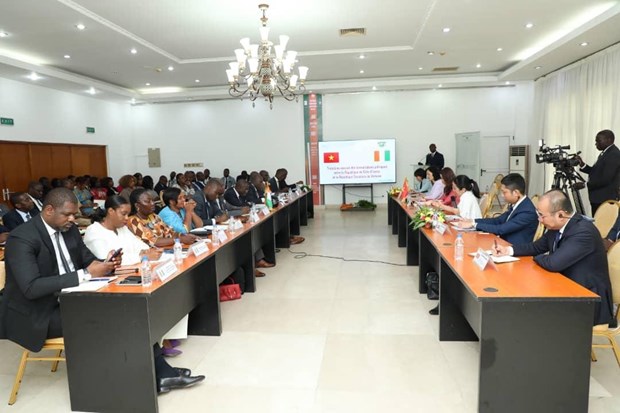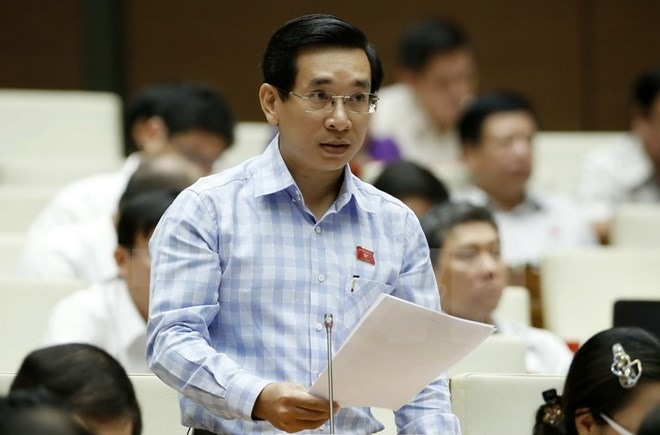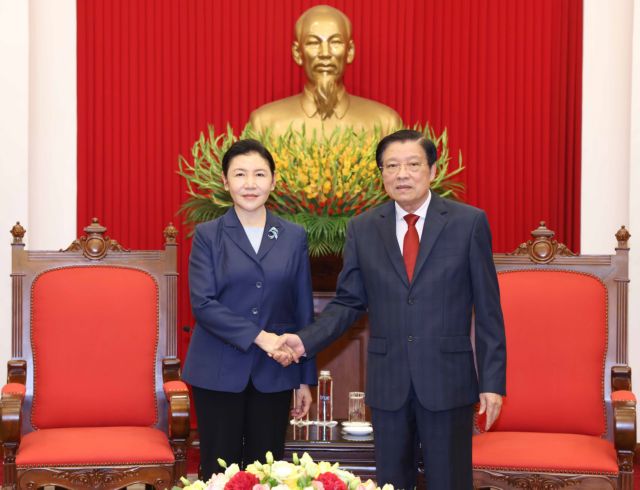 Politics & Laws
Politics & Laws

National Assembly deputies on Monday devoted most of their time discussing proposed changes to the draft Law on the Management and Use of the State assets.
 |
| National Assembly deputies on Monday devoted most of their time discussing proposed changes to the draft Law on the Management and Use of the State assets.— VNA/VNS Photo Văn Điệp |
HÀ NỘI — National Assembly deputies on Monday devoted most of their time discussing proposed changes to the draft Law on the Management and Use of the State assets.
In its report, the National Assembly Standing Committee agreed that it was high time to revise some articles in the law and change the law’s name into “the Law on Management and Use of Public Assets” to make it conform with the Constitution and to the country’s current legal system.
During their discussion, most lawmakers agreed that the changes will contribute to the success of the current fight against corruption and the thrifty use of public assets.
In its report, the National Assembly Standing Committee said it had instructed the drafting committee and the law appraisal committee to include the proposed ideas into Article 7 of the Law to assure that public assets are used efficiently.
The NA Standing Committee also demanded that the changes must not run against other legal documents, including international treaties as written in Article 67 of the draft Law which was presented at the previous 2nd session of the NA full house meeting.
During their discussion, many deputies raised the idea of classifying public assets contained in Article 4. They include the luxury car plates, intellectual property rights, data, intangible assets and others.
Deputy Nguyễn Văn Cảnh, from the southern province of Bình Định said “all car plates, including lucky number plates, are all public assets.” He cited that Article 28 of the Law on Road Traffic has prohibited any acts of buying or selling vehicle plates.
So, he added, if we want to include in the idea of putting a tender on all luxury plates, we must erase the Provision 22 in the Article 28 in the Law on Road Traffic.
However, deputy Nguyễn Văn Cảnh argued that there are 12,186 luxury car plates, for example the series 30A 000.01 to 30A 999.99, which are considered as nice plates. It is estimated that about 61,600 car owners are willing to pay a big sum of money in order to have their car plate with their birth date, wedding date or special numbers which are closely linked to their lives. So, it is projected that each series 99.999 number, we will have VNĐ1.64 trillion (US$72 million). This is food for thought to the NA deputies to discuss and make a final decision.
Earlier in the morning session, deputies discussed the revision of the Law on Denunciations, which was adopted on November 11, 2011 and came into effect on July 1, 2012.
Since it came into force, the law has provided a legal corridor for Vietnamese citizens to exercise their rights to report any legal violations to functional government agencies or mass organisations.
However, in the last half decade of implementation, some limitations and weaknesses in putting the law into practice have been reported.
In his appraisal report, Nguyễn Khắc Định, vice chairman of the NA Law Committee, said “Weakness and limitations during the implementation of the law in the past four years have required us to revise the law to make it serve the people better.”
He continued “It is high time for us to bring the 2013 Constitution into life, particularly the article on human rights and citizens’ rights.”
Định also asked the revising committee to put their amendments ideas in the context of IT application in order to create better conditions for the people to exercise their rights to make denunciations and the co-operations of concern agencies in handling citizens’ complaints and petitions.
Phan Văn Sáu, Government Inspector General, said a key objective of the revised law is to reflect Party and Government’s policies and guidelines toward the settlement of all complaints and petitions as well as the ongoing course of administrative reform.
“A key objective of the revised law is to institutionalise the Party and Government’s policies towards the building of a socialist State ruled by law, a State of the people and for the people. Proposed content and the adjustment framework of the law are all designed to facilitate citizens to exercise their denunciation rights,” Sáu added.
The draft law has nine chapters with 64 articles.
Revised tourism law
Later the same day, NA deputies discussed the revision of the Tourism Law, agreeing on the necessity to revise the law to tackle shortcomings by formulating a clear legal framework, creating conditions for tourism to develop into a spearhead economic sector.
Many lawmakers said there should be preferential policies on tax, investment, planning, land clearance and regional connectivity for tourism.
It was essential to define responsibilities of administrations at all levels in tapping their localities’ advantages, they said.
The compiling board should review related regulations and laws and study tourism development policies to mobilise resources for tourism development and incorporate tourism development into socio-economic development plans.
Regarding regulations on tourism accommodation rankings, some deputies said rankings should be made mandatory to improve hotel quality and create a level playing field for accommodation businesses.
Many deputies also agreed on the need to establish a fund to support tourism development and proposed a regulation to ask tourism businesses to contribute to it. — VNS









